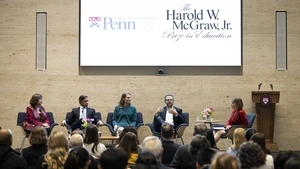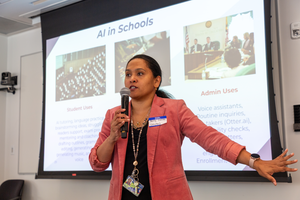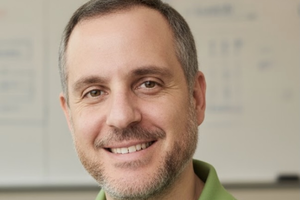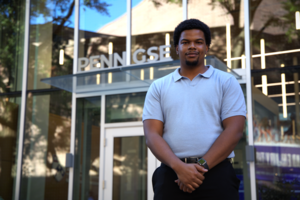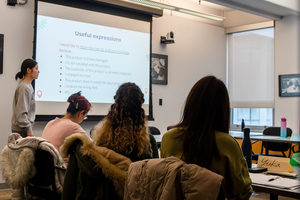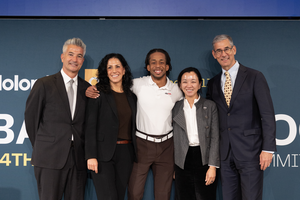These fraudulent messages do not reflect the values of Penn or Penn GSE. We sincerely apologize for the harm and distress these emails have caused and appreciate your understanding as we work quickly to resolve the issue.
Faculty Expert
Past McGraw Prize in Education winners, from left, Sarita Brown, Alberto Carvalho, Christine Cunningham, and Chris Lehmann, discuss sustaining innovation in education with Penn GSE Dean Pam Grossman.
Since 1988, the Harold W. McGraw, Jr. Prize in Education has honored innovators who are transforming teaching and learning. But as the McGraw family thought about the future of the prize, they began looking for a partner to help build on the prize’s legacy.
That led the family to the Perry World House February 13 with Penn President Amy Gutmann, Penn GSE Dean Pam Grossman, and Catalyst @ Penn GSE’s Michael Golden to announce Penn GSE as the new home of the prize.
The announcement was followed by a panel discussion featuring four past prize winners, and marks the kick-off to a series of events, webinars, and publications that will help educators and policymakers around the globe tap into the wealth of knowledge of past and future prize winners. Penn’s innovative group Catalyst @ Penn GSE will lead the efforts to help educators and changemakers put innovative ideas into practice.
“I’m excited about what this partnership is going to mean in the lives of all the young people who will benefit,” said Harold McGraw III.
Alberto Carvalho, 2016 winner and the Superintendent of Miami-Dade County Public Schools, told the crowd that he has seen how the McGraw Prize can inspire change.
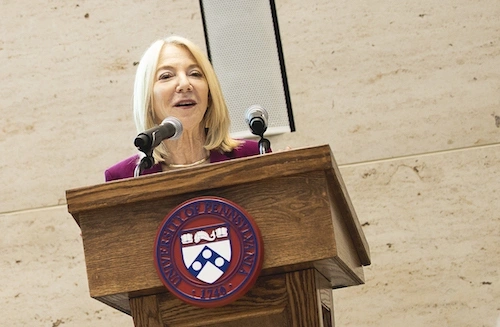
“We don’t do enough to spotlight what’s working in American education,” Carvalho said. “This prize is not about personality. It’s about informed results that are sustainable, amplifiable, and replicable. That’s why this prize is so important.
“After I won, I was floored with calls from people who were saying my school or my community is like yours. 'What can I learn from you? How can we put that into work?' ”
That practical use of knowledge has been at the heart of Penn’s mission since its founding, Gutmann said.
“Finding answers to the most complex challenges requires new ways of thinking, and throughout its history, the McGraw Prize has done exactly that.”
“We’re so proud that the McGraw family has chosen to bring this most prestigious prize to Penn GSE,” Gutmann said. “Finding answers to the most complex challenges requires new ways of thinking, and throughout its history, the McGraw Prize has done exactly that. Its illustrious recipients have changed our understanding of learning and changed, frankly, how we teach.”
The prize was named after Harold W. McGraw, Jr., the former chairman and CEO of McGraw-Hill. During his lifetime, Harold cherished the opportunity to meet winners and ask them about their work.
“He was an innovator, embracing new technologies in his own work,” Grossman said. “As I read and learned more about him, I thought of my own passion for reading and teaching. I felt like we were kindred spirits. I feel like his legacy and his spirit lives on in the prize winners and all that they do.”
Grossman then brought some of those prize winners onstage to discuss what can often be the biggest challenge for someone trying to create change: sustaining innovation long enough that it can have a lasting impact.
“This prize is not about personality. It’s about informed results that are sustainable, amplifiable, and replicable. That’s why this prize is so important.”
Carvalho was joined by 2009 winner Sarita Brown, President of Excelencia in Education; 2017 winner Christine Cunningham, a Professor of Practice in Education and Engineering at Penn State; and 2014 winner Chris Lehmann, the founder and CEO of Philadelphia’s Science Leadership Academy Network.
While they work in different arenas, the winners all agreed than any meaningful change begins with people.
When Cunningham wanted to introduce engineering into elementary and middle school curriculum, she said there were plenty of skeptics. But teachers wanted to collaborate. Together, they developed grade-appropriate lessons that excited students.
“If you really listen to educators, they will know what can make your project a success,” Cunningham said. “They know what their children need to learn.”
Brown told the story of Excelencia in Education’s founding. A funder planned to launch the nonprofit that accelerates Latino student success with a $1 million grant, but then the money fell through. But she and a partner decided to launch anyway. After a hard year of building, Excelencia was on its way to success.
“If you think it’s important, what are you prepared to do?” Brown asked.
Lehmann is known as a thought leader on innovation in education. But he cautioned against confusing new with better.
“We as a group weren’t asking what’s new very often, which is what you might think,” Lehmann said. “We were asking what’s good. And we found those answers were far more powerful and lasting than asking what’s new."
Carvalho, who is credited with transforming an urban district where 73 percent of students live at or below the poverty line, said the biggest obstacle to sustaining innovation can be complacency.
“Your last highest level is the level where you’ll be judged,” Carvalho said. “When your fourth graders are number one in reading and math, and your eighth graders are number two, where do you go? What do you do to combat that fatigue syndrome? That’s the real obstacle that needs to be identified and dealt with.”
The McGraw Prize in Education’s new programing continues with a webinar series this spring. The first of these free webinars on Engineering Equity in K-12 STEM Education will feature Cunningham on February 20.
Three McGraw Prizes—recognizing achievement in pre-K-12 education, higher education, and learning science research—will be awarded October 21 in New York City in partnership with Penn GSE. Each winner will receive a $50,000 gift. Nominations are now open at mcgrawprize.com and will be accepted through April 15.
“We encourage everyone with knowledge and experience of transformative teaching to nominate an educator,” Gutmann said.
Media Inquiries
Penn GSE Communications is here to help reporters connect with the education experts they need.
